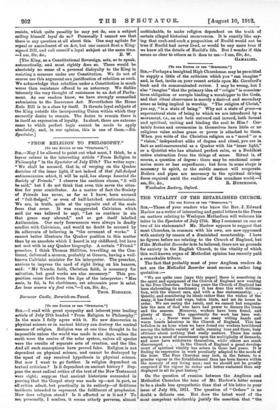" FROM RELIGION TO PHILOSOPHY."
[To THE EDITOR OP THE "SPECTATOR."] SIR,—May I be allowed to point out what must, I think, be a lapsus cab:1mi in the interesting article " From Religion to Philosophy " in the Spectator of July 27th P The writer says : " We shall be accused, that is, of verging on the Quaker doctrine of the inner light, if not indeed of that full-fledged antinomianism which, it will be said, has always haunted the Society of Friends." I observe the cautions clause, "it will be said," but I do not think that even this saves the situa- tion for your contributor. As a matter of fact the Society of Friends has never, as far as I know, been accused of "full-fledged," or even of half-hatched. antinomianism. We are, in truth, quite at the opposite end of the scale from that error. It was exaggerated Calvinism which said (or was believed to say), "Let us continue in sin that grace may abound," and so got itself labelled Antinomian. Our early forerunners were always in deadly conflict with Calvinism, and would no doubt be accused by its adherents of believing in "the covenant of works." I cannot better illustrate the Quaker position in this matter than by an anecdote which I heard in my childhood, but have not met with in any Quaker biography. A certain "Friend " preacher, I think Thomas Sbillitoe, travelling on the Con- tinent, delivered a sermon, probably at Geneva, having a well- known Calvinist minister for his interpreter. The preacher, anxious to impress the need of right living on his hearers, said: " My friends, faith, Christian faith, is necessary for salvation, but good works are also necessary." This pro- position came forth from the lips of the interpreter : " Mes amis, la foi, la foi chretienne, est necessaire pour le saint. Les bons oeuvres n'y font rien."—I am, Sir, &c.,
Barmoor Castle, Berwick-on-Tweed.
Taos. HODGKIN.


































 Previous page
Previous page